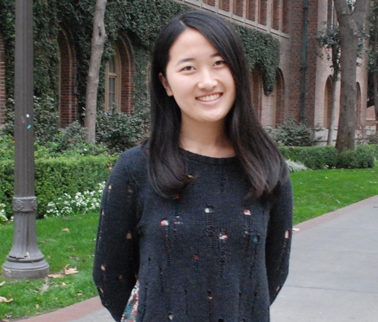
Fiona Guo
Intern Fiona Guo was able to utilize her Chinese heritage and interest in intercultural communication while working on the new Nanjing Massacre testimony collection at USC Shoah Foundation.
Guo is graduating this spring from the University of Southern California with a major in communication. Last year, she began interning with director of research and documentation Karen Jungblut, who tasked her with transcribing and translating testimonies of Nanjing Massacre survivors that the Shoah Foundation had recorded with Nanjing Massacre Memorial Hall in China.
Guo then helped create the questionnaire to be used by the interviewers when they conduct testimonies of Nanjing survivors.
She was interested in working on the Nanjing collection to find out different perspectives about the Nanjing Massacre. She learned about the massacre growing up but thought there had to be more of the story to tell.
“I love listening to stories and I would love to be able to contribute what I know to help the victims and help people hear their voices,” Guo said.
Daisy Miller, former director of community relations at the Shoah Foundation, helped Guo figure out how to structure the questionnaire by interviewing Guo herself about a memory from her childhood. Being interviewed about her own past taught her how to relate to survivors and conduct a sensitive, unobtrusive interview that best allows them to tell their stories freely, Guo said.
“When I came up with questions I imagined myself being that interviewee. I just pictured myself talking to my parents when I was little, asking ‘What did your childhood look like?’ You just enter their life in a not so forced way,” Guo said.
She also put her new skills to use last semester while studying abroad in Amsterdam, interviewing second-generation Chinese Dutch about their cultural identity.
Guo thought the Nanjing survivors’ testimonies were powerful, and they told stories she hadn’t heard before from textbooks or Chinese media.
It’s essential that the Shoah Foundation continue to expand and collect testimonies from other genocides, Guo said, so the voices of survivors from all genocides will be preserved.
“Even if it happened in different places it’s essentially the same thing,” she said. “It’s all about humanity.”